Buko Salad wasn't just a dessert, it was our family's love language during Christmas and New Year celebrations. Every December, I'd watch my mother skillfully shred fresh buko while telling stories of her own childhood holidays, and now, making this creamy Filipino fruit salad takes me right back to those precious moments.
This buko salad recipe, perfected through countless family gatherings, combines the sweet tenderness of young coconut with colorful fruits, chewy nata de coco, palm seeds, and our family's secret twist: cubes of cheese that add an irresistible salty contrast to the sweet, creamy mixture.
After sharing this beloved recipe at countless potlucks and fiestas, I've lost count of how many friends (Filipino and non-Filipino alike) have begged for the recipe.
Once you try this version of Filipino Buko Salad, it'll become your go-to celebration dessert, too.
Jump to:
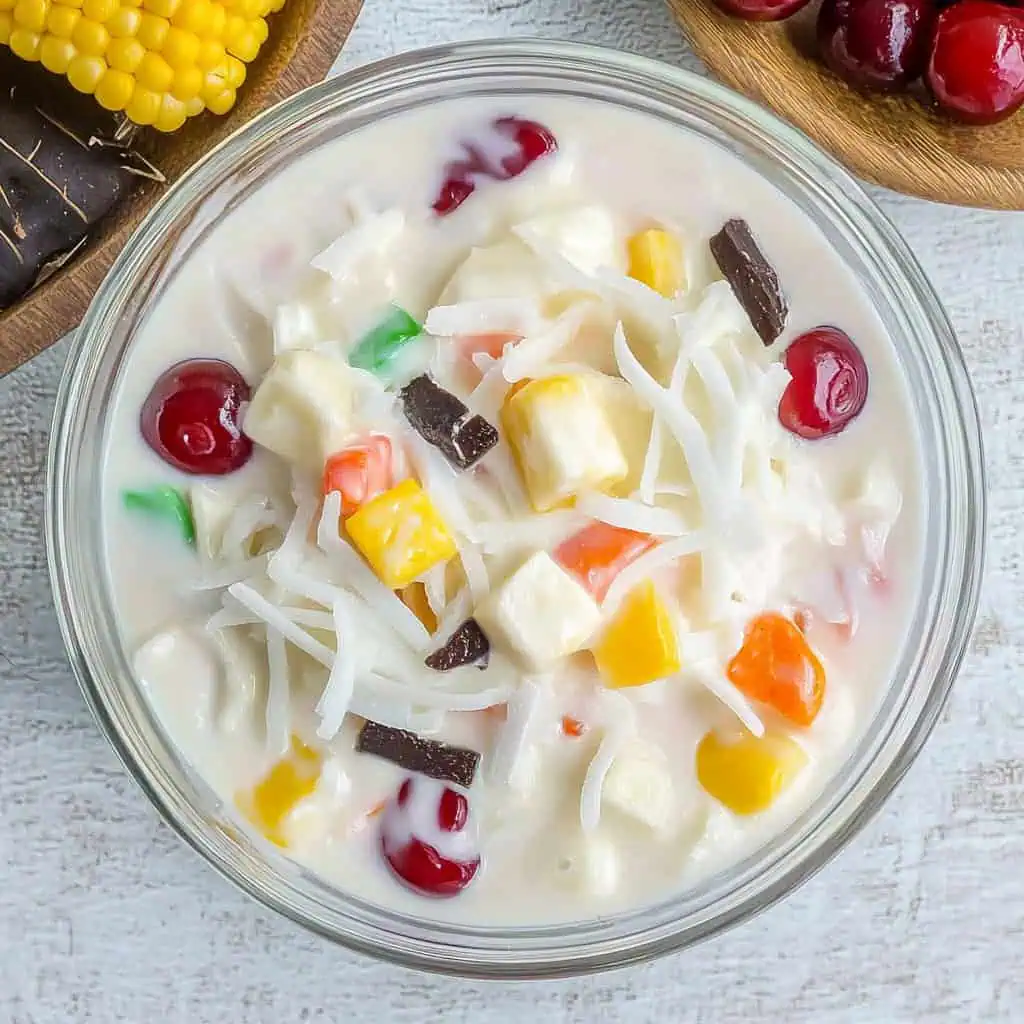
Why You'll Love This Recipe
- 🥥 Perfect balance of creamy and fruity flavors
- 🎄 Traditional Filipino holiday favorite
- 👩👧👦 Kid-friendly and customizable
- 🧊 Can be served chilled or frozen
- 📦 Make-ahead friendly
- 🌟 Guaranteed crowd-pleaser
Ingredients
The ingredients in this Filipino Buko Salad are carefully selected to create a symphony of flavors and textures. Young coconut provides a tender, subtle sweetness as the foundation, while the mixture of fruits adds vibrant colors and natural sweetness.
Nata de coco and kaong bring unique chewy textures that contrast beautifully with the creaminess. The sweetened condensed milk and all-purpose cream create the luxurious, velvety base that binds everything together, while the surprising addition of cheese — a Filipino innovation — adds a gentle salty note that balances the sweetness and makes this dessert truly special.
Each ingredient contributes to the perfect balance of sweet, creamy, and textural elements that has made Buko Salad a beloved staple at Filipino celebrations for generations.
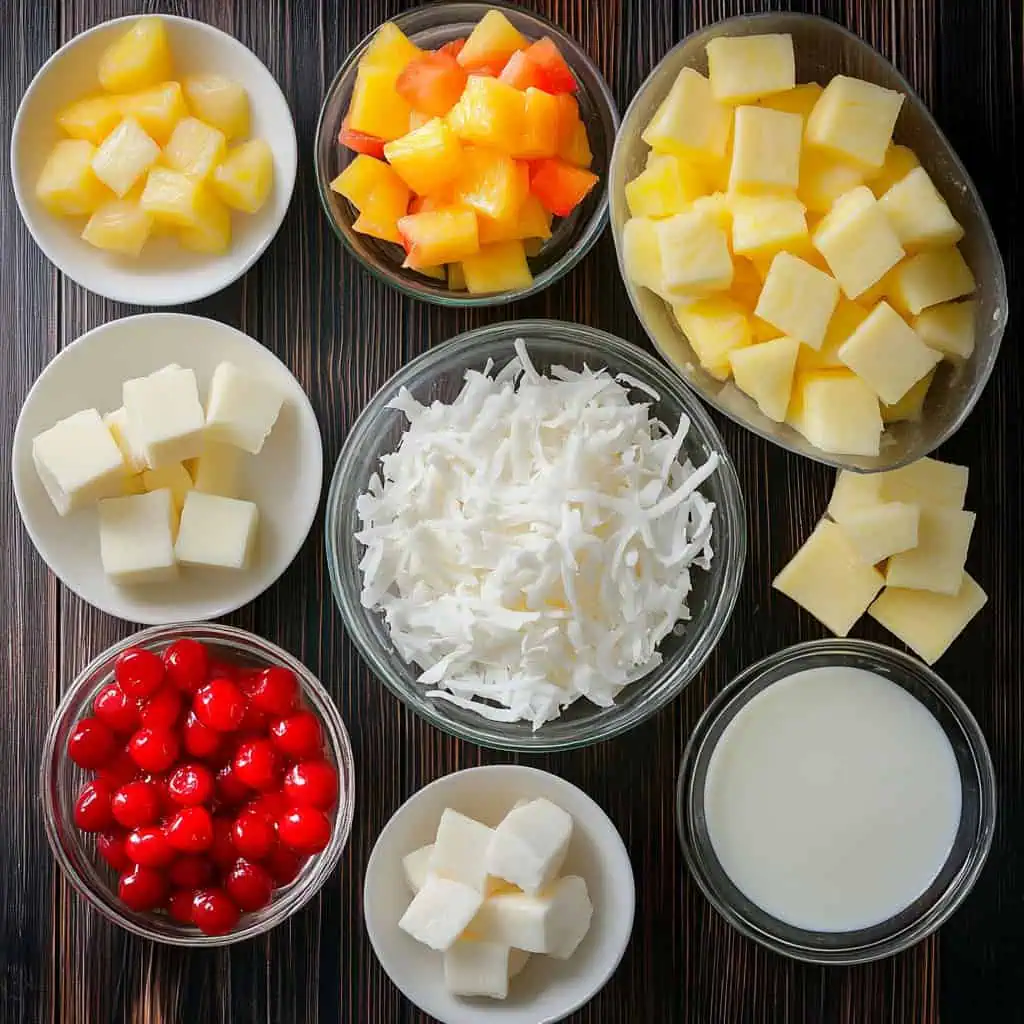
- 4 cups young coconut meat (buko), shredded
- 1 can (30 ounces) fruit cocktail or tropical fruit mix, drained
- 1 can (8 ounces) pineapple tidbits, drained
- 1 can (15 ounces) sweet corn kernels, drained
- 1 bottle (12 ounces) kaong (palm fruits), drained
- 1 bottle (12 ounces) nata de coco (coconut gel), drained
- 1 cup cheese, cubed
- 1 can (14 ounces) sweetened condensed milk
- 1 can (14 ounces) all-purpose cream
Optional Add-ins:
- Fresh grapes, halved
- Diced apples
- Maraschino cherries
- Mandarin oranges
- Lychees
Equipment
- Large mixing bowl - For combining all ingredients with enough space to fold gently without spilling
- Measuring cups - To ensure proper proportions of ingredients
- Colander - Essential for thoroughly draining canned fruits to prevent a watery salad
- Cheese grater - If using block cheese instead of pre-cubed cheese
- Sharp knife - For cutting fruits and cheese into uniform pieces
- Cutting board - Provides a clean surface for preparing ingredients
- Rubber spatula - Allows for gentle folding of ingredients without breaking fruit pieces
- Airtight container - For proper storage to maintain freshness
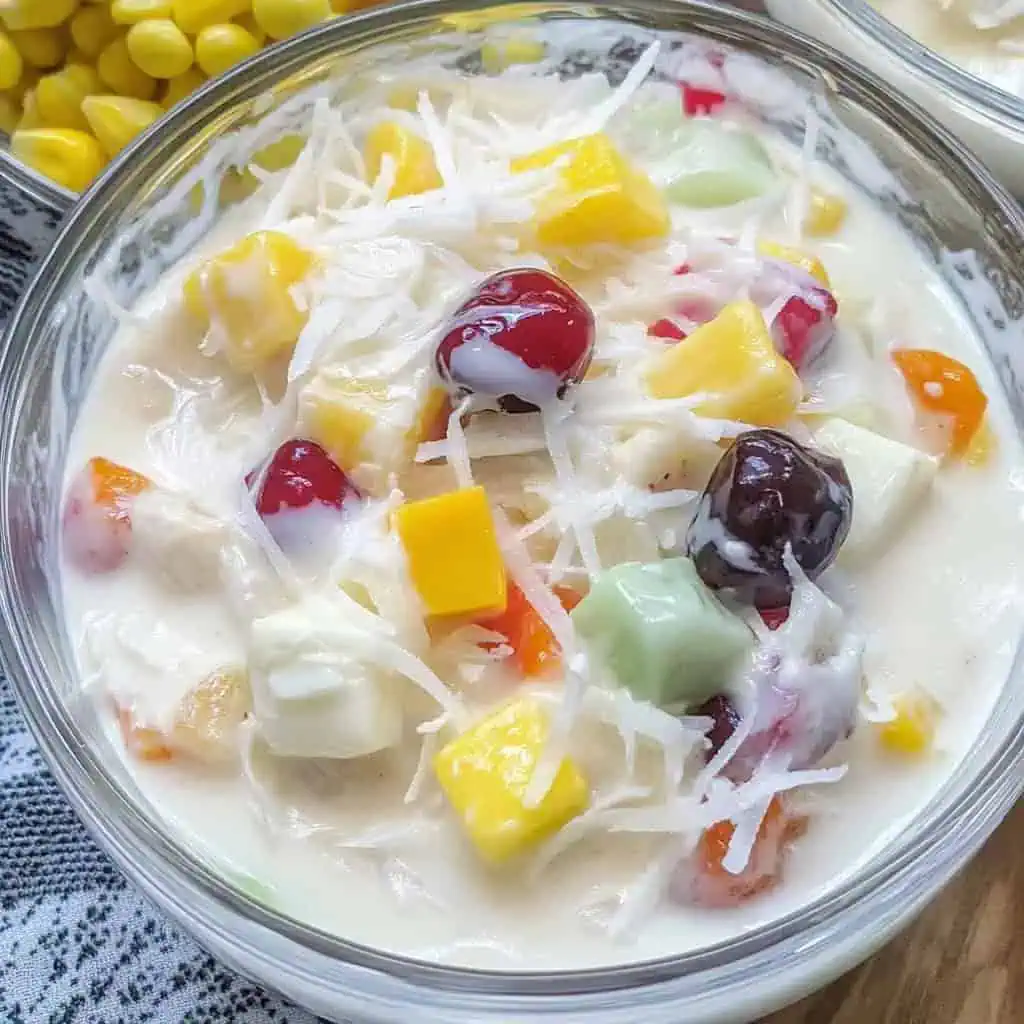
How To Make
- Begin by thoroughly draining all canned fruits in a colander: fruit cocktail or tropical fruit mix, pineapple tidbits, sweet corn kernels, kaong (palm fruits), and nata de coco. If using fresh fruits, wash and cut them into bite-sized pieces. For apples, toss them immediately with lemon juice to prevent browning.
- In a large mixing bowl, place the freshly shredded young coconut meat (buko). Add all the well-drained fruits, kaong, and nata de coco to the bowl. If using optional fruits like grapes, diced apples, maraschino cherries, mandarin oranges, or lychees, add them at this time.
- Take the cheese directly from the refrigerator (4°C/39°F) and cut into small cubes - it's easier to cube when cold. Add the cubed cheese to the fruit mixture. Pour in the sweetened condensed milk gradually, tasting as you go. Add the all-purpose cream. Using a rubber spatula, gently fold all ingredients together until well combined.
- Cover the bowl with plastic wrap and refrigerate for at least 4 hours or overnight. For a firmer texture, freeze for 6-8 hours. If frozen, allow to thaw for 15-20 minutes at room temperature before serving.
- Serve chilled in dessert bowls, optionally garnished with extra cherries and fresh fruits for added color and appeal.

Tips from Lola's Kitchen
- Always drain fruits very well to prevent the salad from becoming too watery
- Add condensed milk gradually and taste as you go - you can always add more, but you can't take it out
- Use cheese straight from the refrigerator - it's easier to cube when cold
- When mixing, fold ingredients gently rather than stirring vigorously to maintain the texture of the fruits
- Save some colorful fruits (especially cherries) for topping just before serving for a beautiful presentation
- For extra coconut flavor, add 1-2 tablespoons of coconut extract to the cream mixture
- Chill serving bowls before filling them with the salad for an extra-refreshing dessert
Substitutions
- Young Coconut: If fresh isn't available, use frozen shredded young coconut (available at Asian markets) or packaged coconut strips
- All-Purpose Cream: Heavy cream or whipping cream works well as a substitute
- Sweetened Condensed Milk: For less sweetness, use half condensed milk and half evaporated milk
- Cheese: Traditional recipes use Velveeta or Edam, but quick-melt cheese, mild cheddar, or even cream cheese can work
- Kaong (Palm Seeds): Substitute with extra nata de coco or additional fresh fruits
- Nata de Coco: If unavailable, use extra fruit or small marshmallows for a similar chewy texture
- Canned Fruits: Fresh seasonal fruits can replace any of the canned options for a more natural flavor profile
- Sweet Corn: This is completely optional - skip if you prefer or replace with more fruits
Troubleshooting
- Too Runny: Drain fruits longer before mixing or add more solid ingredients like additional coconut
- Too Sweet: Balance with more fresh fruits, a touch of lemon juice, or additional plain cream
- Too Firm When Frozen: Let stand at room temperature for 15-20 minutes before serving
- Discolored Apples: Soak in a mixture of water and lemon juice immediately after cutting
- Uneven Texture: Cut all fruits in similar sizes for consistent mouthfeel
- Cheese Becoming Too Soft: Add the cheese cubes just before serving if you prefer them to maintain their firmness
- Coconut Texture Issues: If young coconut is too fibrous, soak in a little milk before adding to soften
Storage & Reheating
- Refrigerator: Keeps for 3-4 days in an airtight container
- Freezer: Lasts up to 2 weeks when properly stored
- Best Practices:
- Place plastic wrap directly on surface before covering to prevent ice crystals
- Divide into smaller containers for easier thawing
- Thaw in refrigerator overnight for best texture
- Stir gently before serving to redistribute cream
- Never refreeze after completely thawing
- If texture changes after storage, add a small amount of fresh cream and gently fold
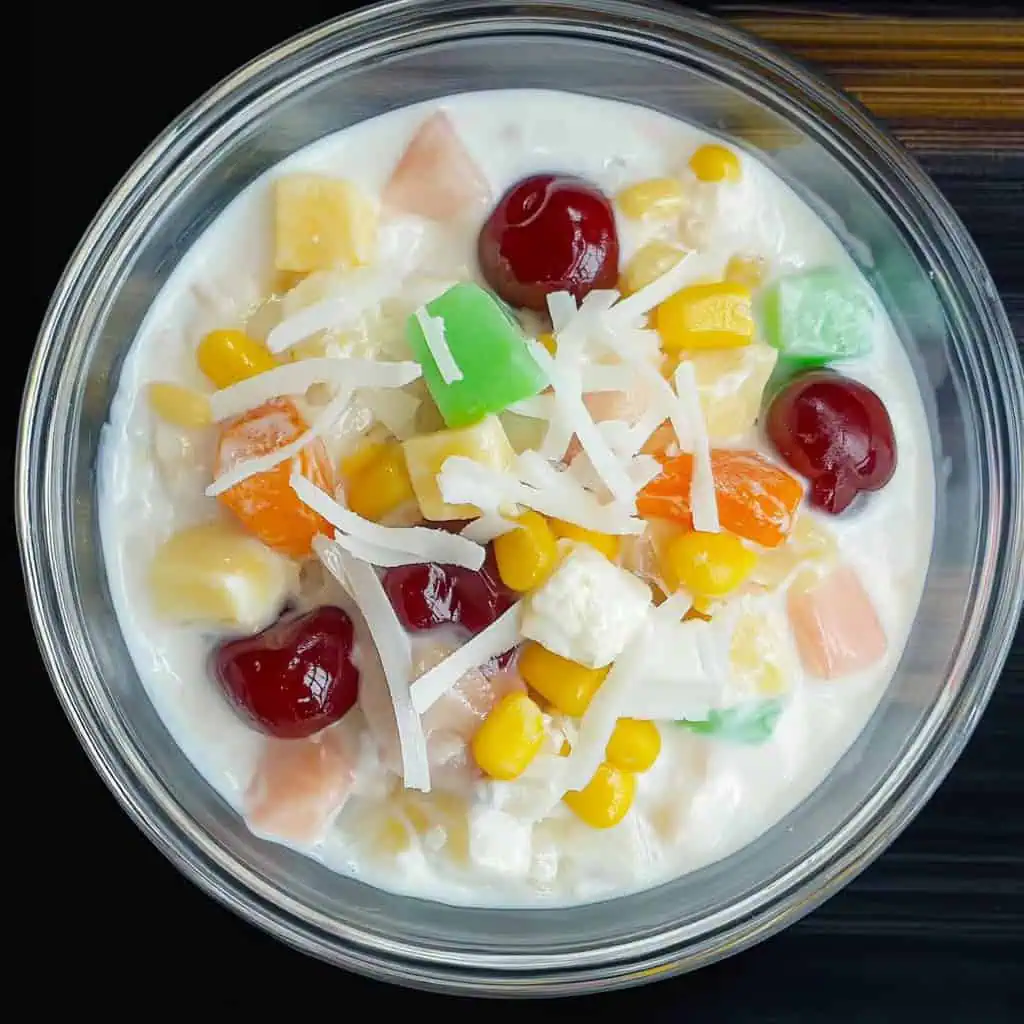
FAQ
Can I make this ahead of time?
Yes! It's actually better when made 1-2 days ahead as the flavors have time to meld together.
How long can it stay at room temperature?
For food safety, no more than 2 hours. Always keep it chilled, especially during warm weather.
Can I use low-fat alternatives to make it healthier?
Yes, you can use light cream and low-fat condensed milk, though the texture might be slightly less creamy.
Why add cheese to fruit salad?
It's a uniquely Filipino tradition that adds a subtle salty contrast to the sweetness, creating a more complex flavor profile.
Can I skip the corn?
Absolutely! It's an optional ingredient that adds texture and subtle sweetness. Many families make it without corn.
Where can I find ingredients like nata de coco and kaong?
Asian markets, Filipino grocery stores, or the international aisle of some larger supermarkets. You can also find these online.
Is there a dairy-free version?
You can substitute coconut cream for the all-purpose cream and use coconut condensed milk. Skip the cheese or use a plant-based cheese alternative.
How do I shred fresh young coconut?
After opening the coconut, use a spoon to carefully scrape the soft meat from the shell. For younger coconuts, the meat will come off in strips naturally.
What kind of cheese works best?
Traditional recipes use Eden, Velveeta, or Quickmelt cheese. The key is to use a mild, slightly salty cheese that won't overpower the sweetness.
Can I serve this as a side dish instead of dessert?
While typically served as dessert, some Filipino families enjoy it as a sweet side dish alongside savory holiday foods.
Related
Looking for other recipes like this? Try these:
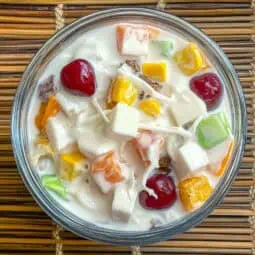
Filipino Buko Salad (Coconut Fruit Salad)
Equipment
- Large mixing bowl (Malaking mangkok) for combining ingredients
- Measuring cups (panukat) for accurate portions
- Colander (salaan) for draining fruits
- Cheese grater (Kudkuran) if using block cheese
- Sharp knife (matulis na kutsilyo) for cutting fruits
- Cutting board (Tabla) for preparation
- Rubber spatula (Rubber na spatula) for gentle mixing
- Airtight container (Lalagyang hindi papasok ang hangin) for storage
Ingredients
Base Ingredients
- 4 cups young coconut meat shredded (buko, kinudkod)
- 1 can 30 ounces fruit cocktail or tropical fruit mix, drained
- 1 can 8 ounces pineapple tidbits, drained (pinya)
- 1 can 15 ounces sweet corn kernels, drained (mais)
- 1 bottle 12 ounces kaong (palm fruits), drained
- 1 bottle 12 ounces nata de coco (coconut gel), drained
- 1 cup cheese cubed (keso)
- 1 can 14 ounces sweetened condensed milk (kondensadang gatas)
- 1 can 14 ounces all-purpose cream
Optional Add-ins
- Fresh grapes ubas, halved
- Diced apples mansanas
- Maraschino cherries
- Mandarin oranges dalandan
- Lychees
Instructions
- Begin by thoroughly draining all canned fruits in a colander (salaan): 1 can (30 ounces) fruit cocktail or tropical fruit mix, 1 can (8 ounces) pineapple tidbits (pinya), 1 can (15 ounces) sweet corn kernels (mais), 1 bottle (12 ounces) kaong (palm fruits), and 1 bottle (12 ounces) nata de coco. If using fresh fruits, wash and cut them into bite-sized pieces. For apples (mansanas), toss them immediately with lemon juice to prevent browning.
- In a large mixing bowl (malaking mangkok), place 4 cups of freshly shredded young coconut meat (buko, kinudkod). Add all the well-drained fruits, kaong, and nata de coco to the bowl. If using optional fruits like grapes (ubas), diced apples, maraschino cherries, mandarin oranges (dalandan), or lychees, add them at this time.
- Take the cheese (keso) directly from the refrigerator (4°C/39°F) and cut into small cubes - it's easier to cube when cold. Add 1 cup of the cubed cheese to the fruit mixture. Pour in 1 can (14 ounces) of sweetened condensed milk gradually, tasting as you go. Add 1 can (14 ounces) of all-purpose cream (Nestle cream). Using a rubber spatula, gently fold all ingredients together until well combined.
- Cover the bowl with plastic wrap and refrigerate (4°C/39°F) for at least 4 hours or overnight. For a firmer texture, freeze (0°C/32°F) for 6-8 hours. If frozen, allow to thaw for 15-20 minutes at room temperature before serving.
- Serve chilled in special dessert bowls, optionally garnished with extra cherries and fresh fruits for added color and appeal.
Tips from Lola's Kitchen
- Always drain fruits very well to prevent the salad from becoming too watery
- Add condensed milk gradually and taste as you go - you can always add more, but you can't take it out
- Use cheese straight from the refrigerator - it's easier to cube when cold
- Save some colorful fruits for topping just before serving
- Let frozen salad thaw for 15-20 minutes before serving for the perfect texture
Nutrition
The Story Behind Filipino Buko Salad (Coconut Fruit Salad)
Buko Salad, a beloved Filipino dessert that graces every celebration table, emerged from our culture's ingenious way of transforming humble ingredients into something extraordinary. While its exact origins aren't documented, this creamy dessert gained popularity in the 1960s when refrigeration became common in Filipino households and imported canned goods were seen as prestigious additions to any gathering.
The evolution of Buko Salad perfectly mirrors the Filipino's adaptable spirit. It started simply – fresh young coconut strips mixed with sweetened milk – before creative home cooks began incorporating canned fruit cocktail, a status symbol during the American influence in Philippine culture. The addition of kaong (palm seeds) and nata de coco (coconut gel) in the 1970s showcased our love for interesting textures, while the uniquely Filipino twist of adding cheese cubes demonstrates our bold approach to fusion flavors.
What makes this dessert particularly special is how it embodies the Filipino value of "bayanihan" – community spirit. During Christmas season or "Pasko," neighbors would often share young coconuts from their trees, with skilled coconut farmers (mangangalkal ng buko) making their rounds to help shred the coconut meat. This communal aspect transformed Buko Salad from a simple dessert into a symbol of Filipino hospitality and celebration.
Today, every Filipino family has their own version of Buko Salad, passed down through generations and modified with personal touches. Some add corn for extra sweetness, others include local fruits like lanzones or rambutan when in season. But the heart of the dish remains the same – it's a dessert that brings people together, whether it's for Noche Buena (Christmas Eve dinner), town fiestas, or simple family gatherings.
The dessert's popularity has transcended Philippine borders, becoming a must-have at Filipino gatherings worldwide. Its adaptability to various dietary preferences – from using light cream for a healthier version to adding premium fruits for special occasions – shows how this humble dessert continues to evolve while maintaining its cherished place in Filipino culinary heritage.
In modern Filipino cuisine, Buko Salad stands as a testament to our culture's ability to blend traditional ingredients with foreign influences, creating something uniquely ours. Whether served in a crystal bowl at an upscale celebration or in simple plastic containers at a neighborhood potluck, this creamy, sweet, and surprisingly complex dessert continues to delight generations of Filipinos and food enthusiasts alike.
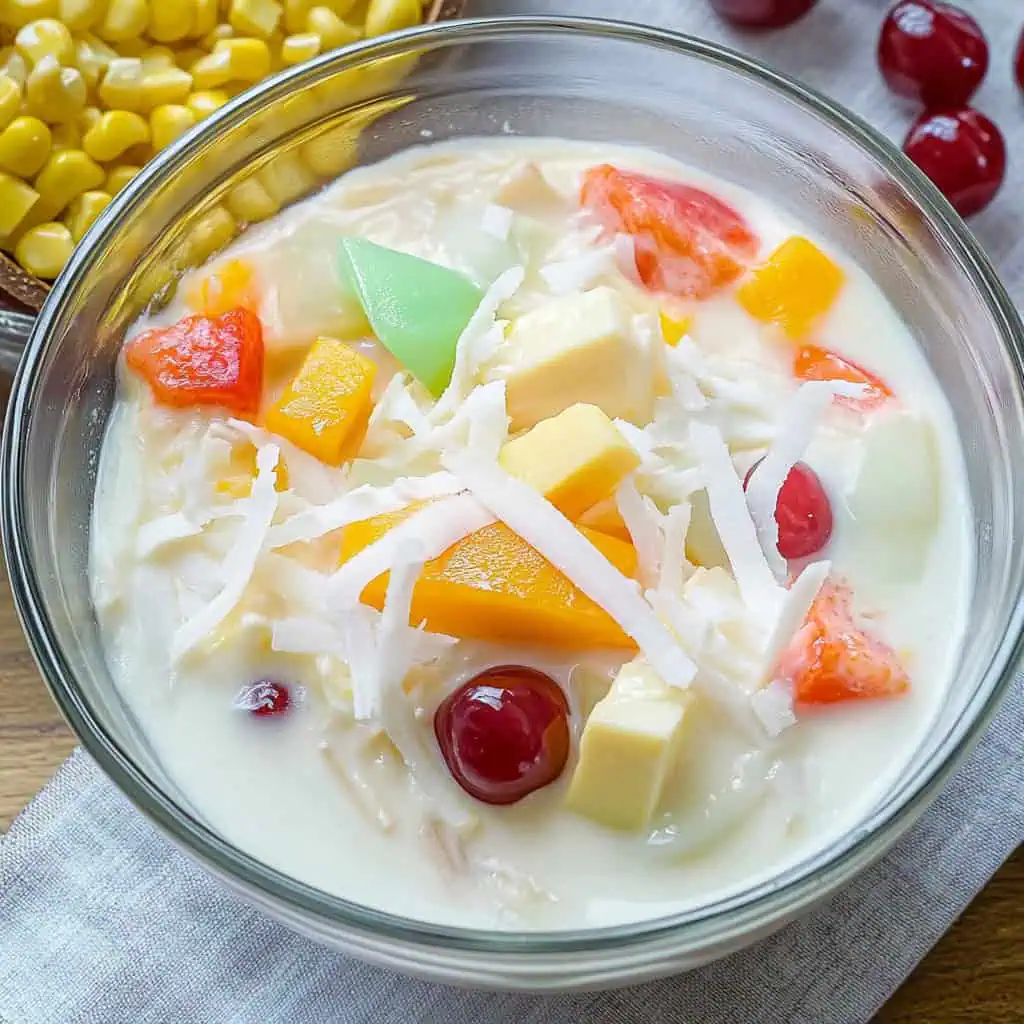

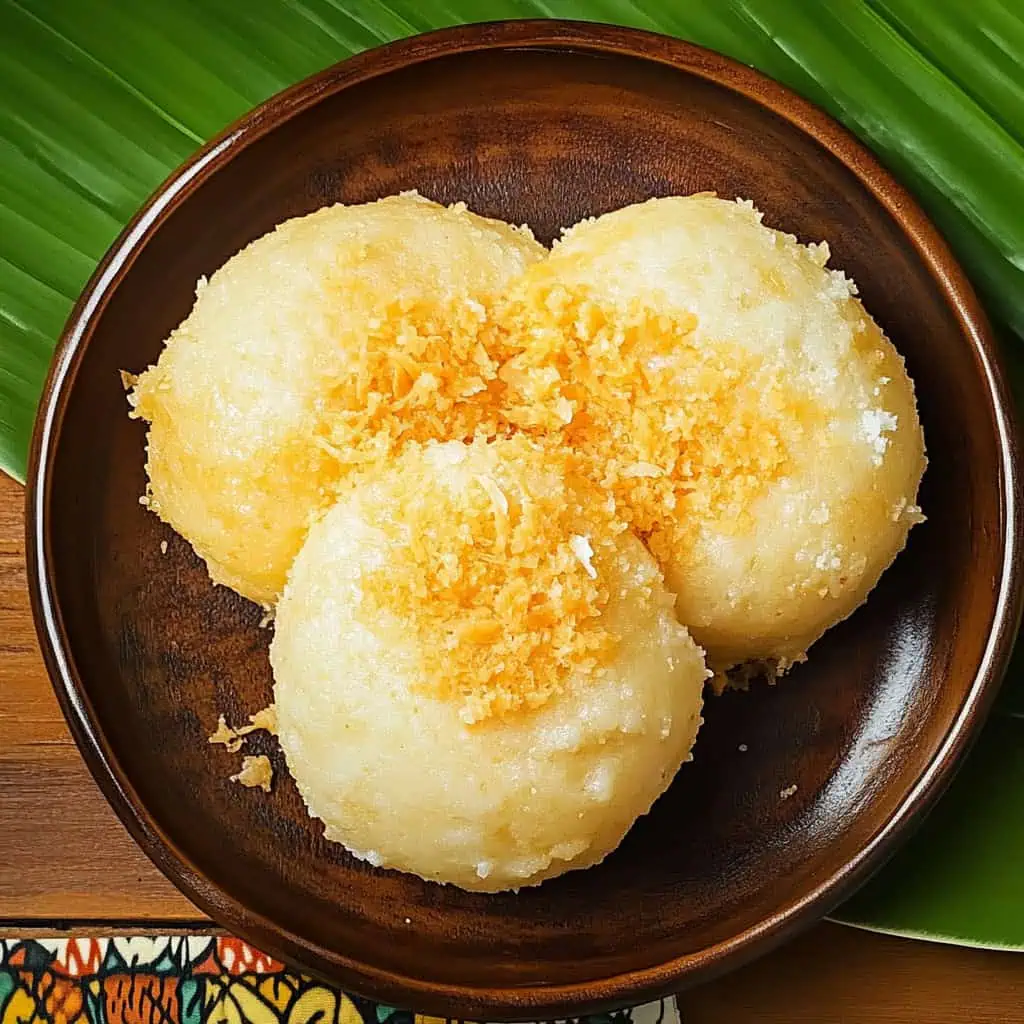
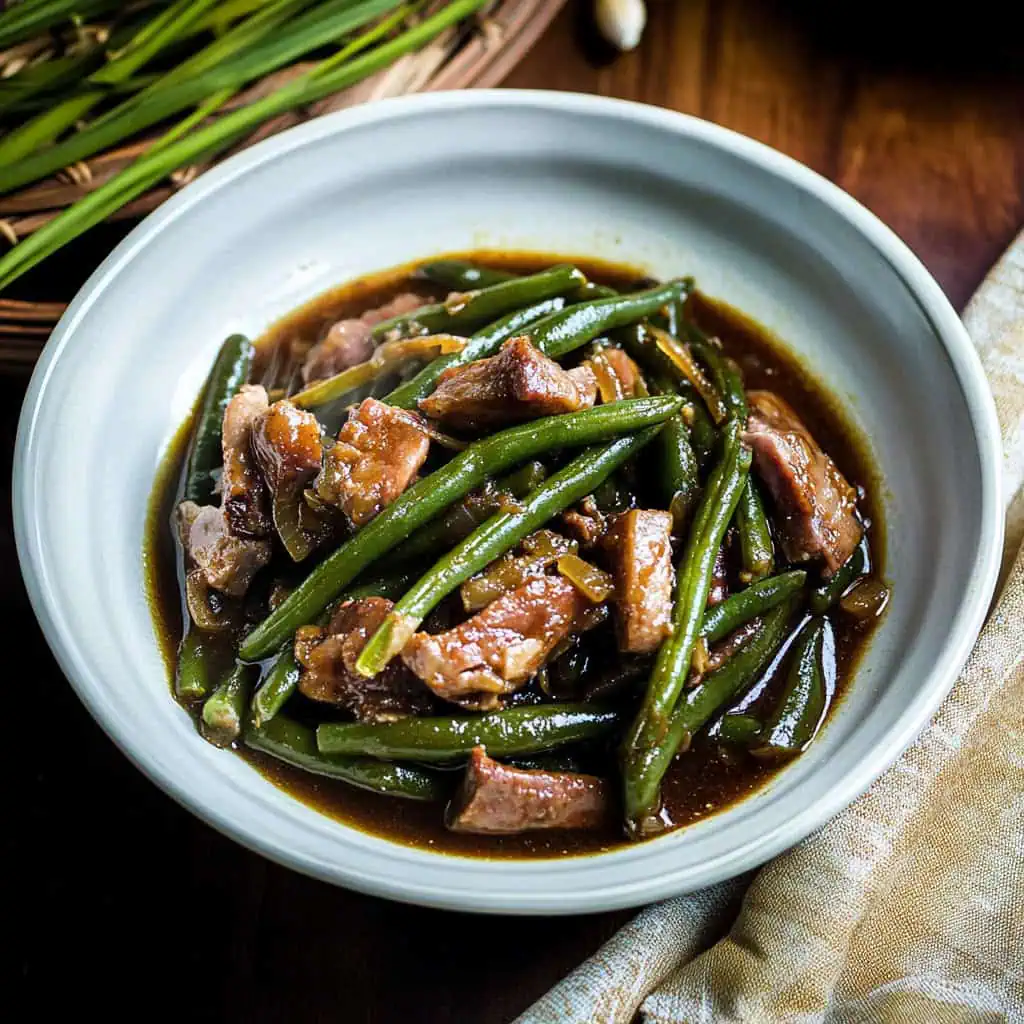
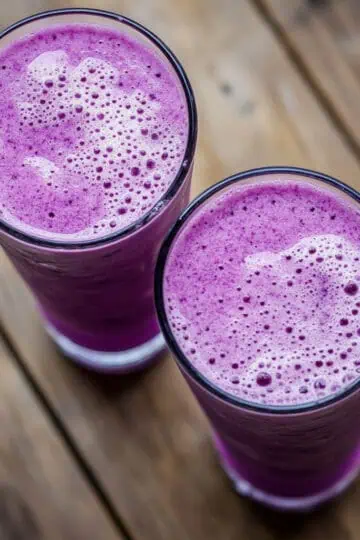
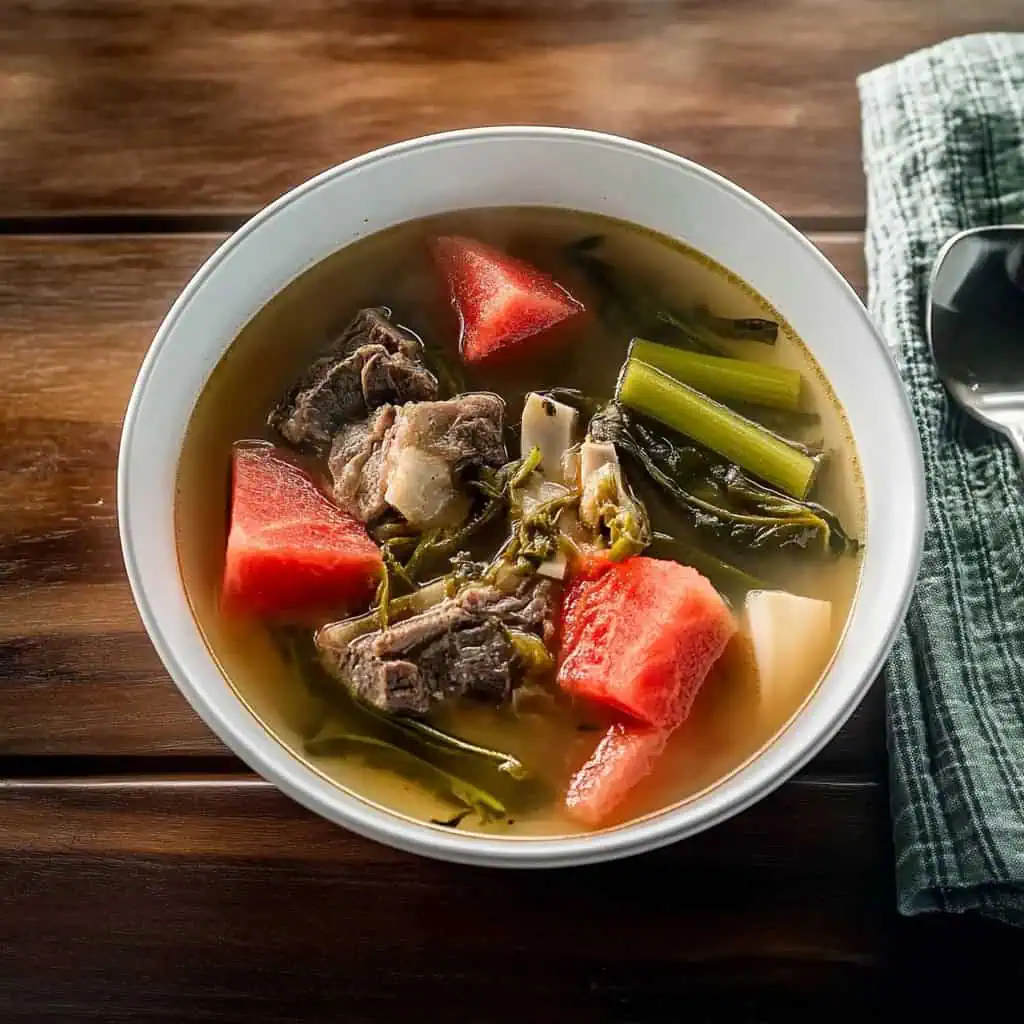


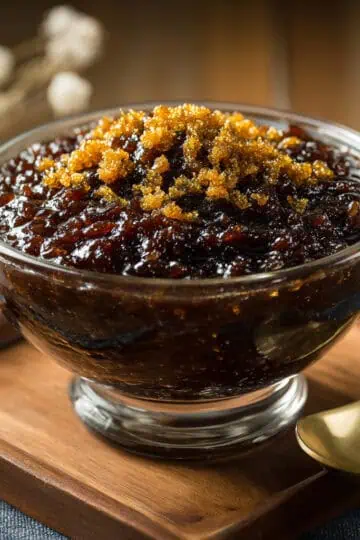
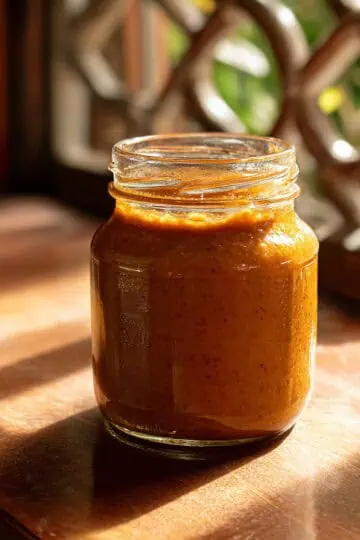
Comments
No Comments